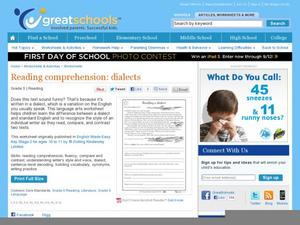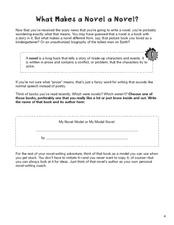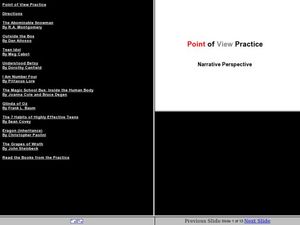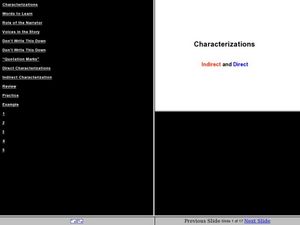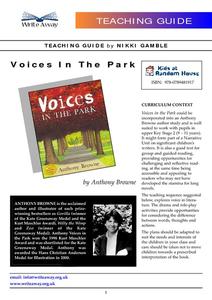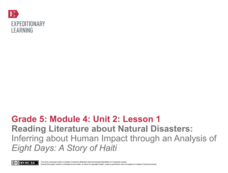K12 Reader
Narrator’s Point of View Flow Chart
How can you tell what point of view a narrator is using, and why does it matter when reading or writing? Use a handy flow chart to determine whether or not your narrator is telling the story from a first or third person point of view.
K12 Reader
Narrator and Point of View
Point of view is important when choosing a narrator. Help young writers distinguish between first and third person point of view with an activity that features excerpts from Robert Louis Stevenson's Treasure Island. After reading four...
EngageNY
Drafting Individual Readers Theater Scripts for a Specific Scene: Rephrasing, Narrator Introduction, and Identifying Characters
Read, revise, refine! Scholars refine their readers theater scripts by rephrasing some of the lines. Next, they write drafts of their narrator introductions and share their work with peers to give and receive feedback.
Curated OER
Reading a Dialect
Reading a dialect can be difficult; show readers that it can also reveal fascinating details! They read two extracts from Jane Gardam's The Hollow Land, which is written in a British dialect. Readers answer comprehension questions,...
EngageNY
Mid-Unit Assessment: Analyzing a New Narrative about a Natural Disaster, Part II
See it through my eyes. Scholars complete mid-unit assessment part II by writing an essay describing how the narrator's point of view influences how the story is told in the text In the Middle of the Storm. Pupils also complete a...
Curated OER
What Makes a Novel a Novel?
As your authors prepare to write a hypothetical novel, they need all the inspiration they can find! Using a book they have already read (and enjoyed), learners complete a literary analysis by filling in eight short-answer questions....
Fluence Learning
Writing About Literature: Comparing and Contrasting Characters in Heidi
Scholars read excerpts from the story, Heidi, in a three-part assessment that focuses on comparing and contrasting characters. Each part contains three tasks that challenge learners to discuss, answer comprehension questions,...
Curated OER
Fifteen Seconds of Fame
A reading of Panic in Paris launches a review of the elements of narrative writing. Class members work in groups to find narrative devices in the book and record their findings on a provided worksheet. Using the completed pages, emergent...
Curated OER
Historical Agency in History Book Sets (HBS)
Study historical events by combining the study of historical fiction and non-fiction. Learners read about true past events in historical fiction novels and then research non-fiction accounts of the same events. What are some differences...
Curated OER
Interpreting Perspective
Work on characterization with a narrative writing lesson plan, in which middle schoolers interpret a character's perspective. They discuss family traditions and examine how culture can influence a character's perspective. Next, they read...
Curated OER
Comparing Poems
Young literary analysts compare two poems by the same author. Readers look for slant rhyme, observe the beat and rhythm of each, and search for repeated vowel sounds. After re-reading, they observe the lack of punctuation and the stanza...
K12 Reader
Point of View: Who Is Telling the Story?
See how famous books of literature have different perspectives with a short worksheet. After reviewing the difference between first and third person points of view, learners look over six passages from various novels and decide which...
Have Fun Teaching
Who Am I? (14)
What's the difference between a clown and a cashier? Use context clues to infer what each character does for a living in five different reading passages. Kids mark their choices on the space provided.
Curated OER
Point of View Practice: Narrative Perspective
Excerpts from ten texts (There's something for everyone from Steinbeck's Grapes of Wrath to Covey's Seven Habits of Highly Effective Teens, and more!) provide the springboard for an examination of point of view. For each short excerpt,...
EngageNY
Analyzing Point of View: Inferring about the Natural Disaster in Eight Days
Who is telling the story? Readers take a look at the text Eight Days to determine if the story is told in first or third person. They then discuss in groups and complete a shared writing activity to describe how the narrator's point of...
EngageNY
Analyzing Point of View: Inferring about the Impact of Hurricane Katrina on People Living in New Orlean
What, where, how? Readers hone their analysis skills as they determine the narrator's point of view in Eight Days. They complete a literary analysis chart and essay to describe what and where events take place. Individuals then discuss...
Curated OER
Finding Problems In A Story
Students categorize information into a problem/solving chart and examine the value of using a diary. In this problem solving and diary lesson, students read portions of Dear Mr. Henshaw, while they investigate the importance of keeping a...
Curated OER
Characterizations: Indirect and Direct
Connect literature to narrative writing by researching descriptive writing techniques. Elementary and middle schoolers identify the importance of a narrator and voice in the storytelling process. They read writing samples and identify...
Write Away!
Voices In the Park
Explore the impact a narrator's point of view has on a story with a reading of the children's book, Voices in the Park by Anthony Browne. Written in four different voices, the story is told and retold from different perspectives to...
Reed Novel Studies
The Little Prince: Novel Study
Do our eyes play tricks on us? The Little Prince narrator begins with a discussion of the difference in what grown-ups and children see. Scholars read how he puts this to the test using a drawing and find synonyms to vocabulary words,...
EngageNY
Reading Literature about Natural Disasters: Inferring about Human Impact through an Analysis of Eight Days: A Story of Haiti
This is a disaster. Scholars look through the book Eight Days: A Story of Haiti and discuss their wonderings about the text and natural disasters. They then complete a first read to determine gist and second read to answer text-dependent...
MENSA Education & Research Foundation
Magical Musical Tour: Using Lyrics to Teach Literary Elements
Language arts learners don't need a lecture about poetry; they listen to poetry every day on the radio! Apply skills from literary analysis to famous songs and beautiful lyrics with a lesson about literary devices. As class...
K12 Reader
Change the Point of View: First Person and Third Person
How is a story different when told from various points of view? Learn about first and third person points of view with an activity based on Robert Louis Stevenson's Treasure Island. Readers examine a passage written in first person, then...
Curated OER
Rumpelstiltskin, Private Eye
Learners prepare a classroom theater presentation of Rumpelstitskin in which the narrator is a private eye. They write the defense of one of the characters who conspired against the king and play a vocabulary game.
Other popular searches
- Point of View Narrator
- Author and Narrator
- Unreliable Narrator
- First Person Narrator
- Identify Narrator
- Identifying the Narrator
- Point of View/narrator
- Omniscient Narrator
- Identify Narrator or Speaker
- Narrators Point of View
- Narrator Mask
- Narrator and Voice





